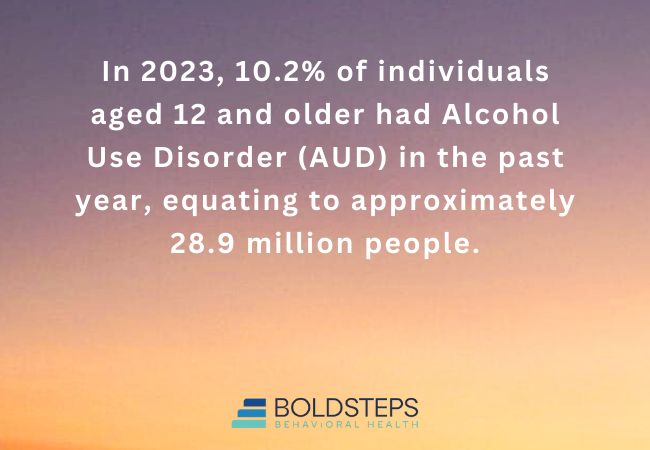Alcohol consumption is often seen as a way to relax and socialize, but its impact on the brain is profound and long-lasting. While occasional drinking may not cause noticeable harm, prolonged alcohol use alters brain chemistry, disrupts cognitive function, and fuels addiction. The brain, which controls judgment, memory, coordination, and emotions, is particularly vulnerable to alcohol-induced damage.
For those struggling with Alcohol Use Disorder (AUD), understanding how alcohol affects the brain can help in recognizing the dangers of addiction and the importance of professional treatment. At Bold Steps Behavioral Health in New Hampshire, we offer a comprehensive Alcohol Addiction Treatment Program designed to help individuals break free from alcohol dependence and regain mental and physical health.
This article explores:
- How alcohol disrupts brain function
- The connection between alcohol and addiction
- Long-term effects on memory, mood, and cognition
- The recovery process and brain healing
How Alcohol Disrupts Brain Function
Alcohol interferes with neurotransmitters and brain regions, leading to temporary impairments and long-term damage if alcohol use continues.
1. How Alcohol Alters Brain Chemistry
The brain operates through neurotransmitters—chemical messengers that control mood, behavior, cognition, and bodily functions. Alcohol disrupts the balance of these chemicals, leading to:
- Increased GABA (Gamma-Aminobutyric Acid) Activity:
- Slows down brain function, leading to relaxation, drowsiness, and impaired coordination.
- Excessive activation leads to blackouts, memory loss, and speech impairment.
- Reduced Glutamate Activity:
- Glutamate is an excitatory neurotransmitter responsible for learning and memory.
- Alcohol suppresses glutamate, causing slowed thinking, poor memory retention, and difficulty concentrating.
- Dopamine Surge and the Brain’s Reward System:
- Alcohol triggers dopamine release, producing a feeling of pleasure and euphoria.
- Over time, the brain relies on alcohol for dopamine production, leading to cravings and addiction.
The Impact of Alcohol on Different Brain Regions
1. Prefrontal Cortex (Decision-Making and Self-Control)
- Controls judgment, impulse control, and problem-solving.
- Alcohol weakens this area, leading to poor decision-making and compulsive drinking.
- Long-term effect: Reduced ability to control alcohol consumption and increased risk of relapse.
2. Hippocampus (Memory and Learning)
- Plays a critical role in forming new memories and learning.
- Alcohol prevents proper memory formation, causing blackouts and forgetfulness.
- Chronic damage leads to alcohol-induced dementia and permanent memory loss.
3. Amygdala (Emotions and Stress Response)
- Regulates fear, anxiety, and emotional processing.
- Alcohol reduces anxiety short-term, but long-term use increases stress and emotional instability.
- Heavy drinking is linked to increased risk of depression, anxiety disorders, and PTSD.
4. Cerebellum (Balance and Motor Coordination)
- Controls movement, coordination, and reflexes.
- Alcohol disrupts cerebellum function, leading to:
- Slurred speech
- Unsteady movements and increased fall risk
- Permanent motor impairments with long-term abuse
5. Brainstem (Basic Life Functions: Breathing & Heart Rate)
- Regulates automatic functions like breathing and heart rate.
- Alcohol poisoning can suppress brainstem activity, leading to:
- Respiratory depression (slow or stopped breathing)
- Coma or death in extreme cases
How Alcohol Fuels Addiction: The Cycle of Dependence
Alcohol addiction is not just a habit—it’s a brain disease caused by repeated neurochemical changes that lead to dependence.
1. The Initial Reward
- Alcohol triggers dopamine release, causing pleasurable sensations.
- The brain associates alcohol with pleasure, reinforcing drinking behavior.
2. Tolerance Development
- Over time, the brain produces less dopamine naturally.
- Individuals need to drink more to feel the same pleasurable effects.
3. Dependence Formation
- The brain adapts to alcohol presence and struggles to function without it.
- Withdrawal symptoms (shakiness, anxiety, nausea) make quitting difficult.
4. Addiction and Loss of Control
- The prefrontal cortex is weakened, leading to poor impulse control.
- The individual craves alcohol and struggles to quit despite negative consequences.
Breaking this cycle requires professional treatment to rewire the brain and restore healthy function.
The Long-Term Effects of Alcohol on Mental and Cognitive Health
Chronic alcohol use damages the brain over time, leading to serious conditions, including:
1. Alcohol-Related Dementia & Memory Impairment
- Heavy drinking increases the risk of dementia by threefold.
- Wernicke-Korsakoff Syndrome (Wet Brain): A severe memory disorder caused by Vitamin B1 deficiency, leading to:
- Confusion and disorientation
- Severe memory loss
- Loss of muscle coordination
2. Increased Risk of Mental Health Disorders
- Alcohol use exacerbates conditions like:
- Depression – Linked to 60% of suicide attempts.
- Anxiety disorders – Alcohol withdrawal worsens panic attacks.
- Bipolar disorder and psychosis – Alcohol interferes with brain stability.
3. Sleep Disorders and Insomnia
- Alcohol disrupts REM sleep cycles, leading to:
- Poor sleep quality and daytime fatigue.
- Increased risk of chronic insomnia and nightmares.
Reversing Alcohol’s Impact: Treatment and Brain Recovery
1. Medical Detox for Brain Stabilization
- Safely manages withdrawal symptoms under medical supervision.
- Prevents severe complications like seizures and delirium tremens (DTs).
2. Partial Hospitalization Program (PHP)
- Full-day treatment with therapy and medical care.
- Structured environment for early recovery stabilization.
3. Intensive Outpatient Program (IOP)
- Flexible scheduling for individuals transitioning from PHP.
- Cognitive therapy to retrain thought patterns.
4. Behavioral Therapy for Brain Healing
- Cognitive Behavioral Therapy (CBT) – Helps rewire negative thinking.
- Dialectical Behavior Therapy (DBT) – Focuses on emotional regulation.
- Mindfulness and Meditation – Reduces stress and rebuilds cognitive function.
5. Long-Term Outpatient & Virtual Treatment
- Continued support for preventing relapse and strengthening brain function.
Conclusion
Alcohol alters the brain, making quitting extremely difficult without professional support. However, with the right treatment, brain healing is possible.
At Bold Steps Behavioral Health in New Hampshire, our Alcohol Addiction Treatment Program provides evidence-based care to help individuals recover from alcohol dependence and regain cognitive function. Call (603) 915-4223 to learn more about our Alcohol Addiction Treatment Program in New Hampshire. Your brain, your health, and your future matter—take the bold step toward recovery today.
FAQ on How Alcohol Affects the Brain and Leads to Addiction
How does alcohol affect brain chemistry?
Alcohol interferes with neurotransmitters in the brain, disrupting mood, cognition, and decision-making. It:
- Increases GABA activity, slowing down brain function and causing relaxation.
- Reduces glutamate activity, impairing memory and learning.
- Triggers dopamine release, reinforcing addictive behavior by creating a false reward system.
What happens to the brain with long-term alcohol use?
Chronic alcohol use leads to:
- Memory loss and cognitive decline (hippocampus damage).
- Poor impulse control and decision-making (prefrontal cortex damage).
- Increased risk of anxiety and depression (amygdala dysfunction).
- Motor skill impairment (cerebellum damage).
Can alcohol permanently damage the brain?
Yes, excessive alcohol consumption can cause permanent brain damage, particularly conditions like:
- Wernicke-Korsakoff Syndrome (Wet Brain) – A severe memory disorder caused by Vitamin B1 deficiency.
- Alcohol-Related Dementia – Cognitive decline similar to Alzheimer’s.
- Neurotoxicity – Long-term alcohol use can kill brain cells, reducing brain volume.
How does alcohol addiction develop?
Alcohol addiction follows a cycle of:
- Initial use and pleasure response (dopamine surge).
- Increased tolerance requiring more alcohol for the same effects.
- Brain adaptation, leading to dependence and withdrawal symptoms.
- Loss of control, where alcohol becomes necessary for daily function.
What are alcohol blackouts, and why do they happen?
Alcohol blackouts occur when excessive drinking prevents the brain from forming new memories. This happens due to alcohol’s suppression of hippocampal function, leading to:
- Fragmented or lost memories from the drinking period.
- Inability to recall events despite appearing conscious at the time.



